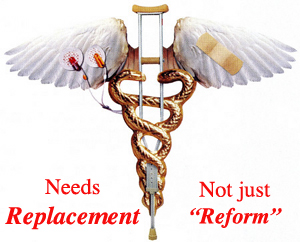
President Obama has set out a bold agenda to fix our country. While the recession dominates the media, the President has not limited his attention to just the economy but includes education and healthcare as matters to be addressed immediately. "Healthcare reform" is very much on the table. Indeed, we already have begun to throw money at it: the stimulus package (ARRA '09) allocates ≈$150 billion to healthcare.
As someone who works within the healthcare system, I would be the last to reject more money to work with. However, money is NOT the answer and healthcare reform is wrong, even dangerous.
Reform is defined as a beneficial change and more specifically, it means to re-form back to something's original design or shape. Healthcare never was "designed." It evolved or as most would say, it grew without any central planning and absent any mechanism to adapt. Healthcare "reformers," very much including the President, intend to make what we have work better - a laudable goal but not possible.
No one can make what we have work better. The system is inherently flawed, designed improperly (actually not designed at all), and plagued with internal contradictions that cannot be simply adjusted. The system must be replaced, not reformed or re-formed.
Consider just one internal inconsistency: health insurance, the media healthcare topic de jour. You pay (or government pays) a premium and expect service in return. But a private company generates profit (*) or the government saves money by NOT giving the service. So our current system tries to avoid providing the very thing you paid for. Imagine a car company systematically trying not to deliver the cars we buy. Worse, supply and demand - a critical element of any functional capitalist society - cannot balance when the consumer (the patient) is not the payer (insurance company or government) because the consumer has no reason to economize.
(*) Before you scream that insurance companies shouldn't be making those obscene profits, check your pension portfolio. You are likely to find insurance stocks. As a patient you want service, service that costs money. As shareholder, you want the insurance company to generate profits (not spend money) - another example of healthcare system inconsistency.
You cannot cure a patient, especially one named Healthcare: a) by treating symptoms; b) by curing one problem while leaving the others; or c) by making treatment decisions based on logic alone (without evidence.) Doing these things is practicing bad medicine. That is what we will be doing with the healthcare "reform" currently proposed.
Forty-six million without health insurance is a huge problem, one that induces other downstream problems. Per se, lack of insurance is a symptom not a cause. Treating it alone will not cure the patient (healthcare) or even make it better. It will temporarily make the patient feel or maybe just look better.
Suppose we could "cure" the insurance problem somehow. Would that cure healthcare? Not a chance. Having insurance does not guarantee having a nurse or doctor (personnel shortages). Having everyone insured will not produce a cure for breast cancer. Having insurance will have no effect on the medical error rate. Having universal insurance with our current system will either bankrupt our nation or guarantee government rationing of medical care.
Healthcare reform is not just wrong. It is dangerous. Systems thinkers show us example after example where manipulating only one part of a system, in this case modifying healthcare financing, actually makes things worse. Healthcare "reform" reinforces the idea that a quick answer exists. It does not. You cannot cure healthcare overnight, probably not over two terms. Healthcare "reform" diverts our attention and our resources from what we need: a national dialogue about healthcare followed by a plebiscite that forms guidelines for an entirely new healthcare system.
Healthcare reform is a chimera, a shell game, or just plain snake oil.
We need healthcare replacement, not reform.